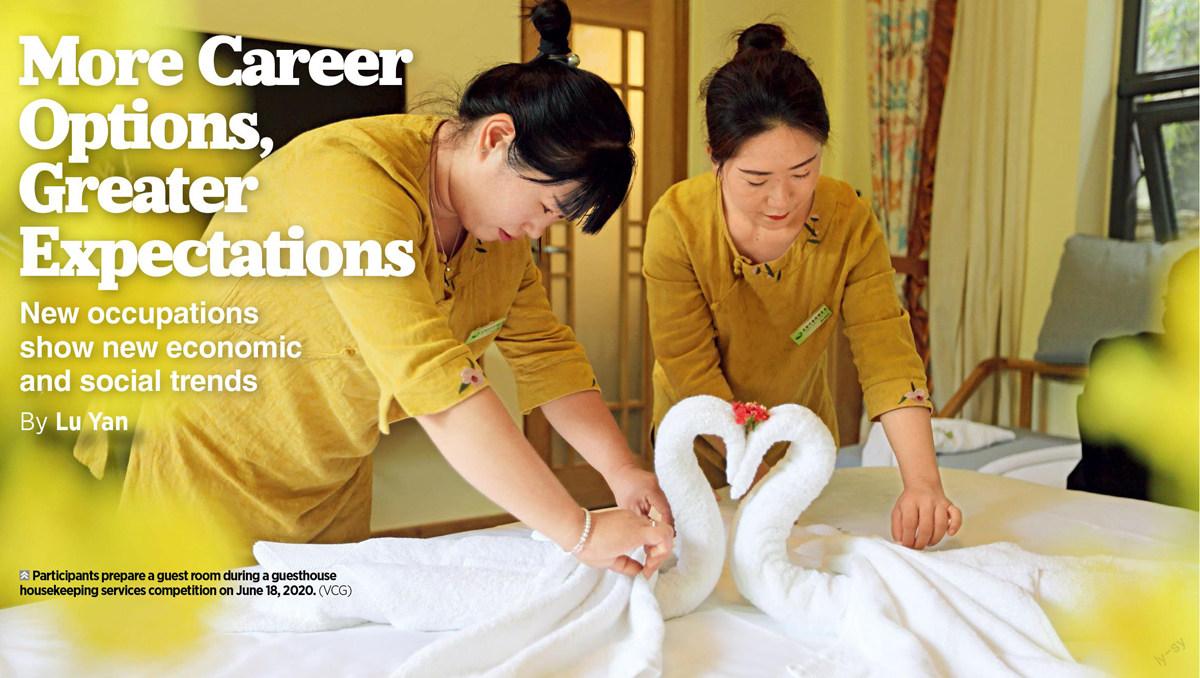More Career Options, Greater Expectations
Lu Yan

Xia Min is excited to see on the news that an occupation called parenting instructor might soon gain official recognition from Chinas human resources authority. As a college student majoring in education, she first became familiar with the profession a year ago through a television drama and has grown more interested in it ever since.
“Parents have great expectationsfor their children and are underpressure to nurture them, butsometimes they may become soanxious that they overparent, passing on their stress to the children andharming family harmony,”saidXia.“I would like to be the personwho helps parents adopt effectiveparenting styles and raise their kids in a healthy way.”
The 21-year-old is currentlypursuing further education in herhometown of Xuzhou, JiangsuProvince, while learning moreabout the newly recognizedoccupation, which is among the18 new professions the Ministryof Human Resources and SocialSecurity (MHRSS) announced it was considering adding to the countrys list of professions.
“New occupations reflect theindustries and fields that are inurgent need of development underthe changing internal and externalenvironment of the country. Theyalso demonstrate that economictransformation and upgrading arehappening,”said Zhang Chenggang, a job market researcher at theCapital University of Economics and Business in Beijing.
Emerging Options
The new professions, unveiled in June to solicit public feedback fortheir upcoming certification, fallinto three fields: digital and hi-tech fields such as robotics engineeringtechnicians, data security engineers and digital solution designers;the service industry, includingparenting instructors; energy andenvironmental protection, likecarbon sequestration assessors, and energy efficiency and carbon-neutral building consultants, accordingto a statement published on theMHRSSs website. Some of theseoccupations reflect the countrysdigitalization plus carbon peakingand neutralization trends, thestatement read.
Chinas occupationalclassification has been constantlyupdated. In 1999, the countrypublished its first occupationalclassification reference book, which included over 1,800 occupations. In 2010, the government began revising the book by adding new occupations, and published the latest editionin 2015. From 2019 to 2021, 55 newoccupations were included on thelist.
“Many new occupations areattractive to university graduates and become new choices for theirfuturecareer,”said Li Changan, aprofessor at the School of PublicAdministration at the Universityof International Business andEconomics, who focuses on laborand educational economics. He saidsome of the new occupations areupgrades of the traditional ones, like express delivery service people, while others are brand new ones born with new business forms such as block-chain engineering technicians andonline marketers.
KuangXianming, director of the Economic Research Center at theHainan-based China Institute forReform and Development, believes the new and the traditional are not contradictory; rather, the formeris a supplement to the latter.“Forexample, an agricultural manager [someone who assumes themanagerial role in an agriculturalcooperative, oversees agriculturalproduction, offers technicalsupport or markets its products]facilitates the introduction ofmodern management conceptsinto the development of traditional agriculture, accelerating ruraldevelopment,”Kuangsaid.“Newoccupations emerging today maybecome the norm tomorrow.”
Sun Jianqin is an agriculturalmanager in Wuxi, Jiangsu Province. In 2019, with the ambition to helpall fellow villagers increase theirincomes, the farmer applied to attend lectures at the Suzhou PolytechnicInstitute of Agriculture in Jiangsuto study management, marketing,finance, policies and regulations—all that are required to be a professional consultant and manager for farmers.
During his daily work, Sun solves a wide range of problems for othervillagers while also running his own family farm. Once, several of themasked why the quality peaches theygrew could not be sold at a decentprice. Sun remembered from hisstudies that during peach season,fierce market competition made itdifficult to sell good peaches at agood price.
He then came up with the idea of establishing a brand and telling aunique story so that more customers would come to know about theirpeaches. He also led farmers toparticipate in national and regionalpeach competitions in which theywon several awards.
According to an MHRSS reportreleased last year, total demand foragricultural managers in China,which has a rural population ofaround 500 million, will reach about 1.5 million people between 2021 and2025.
Alongside the occupations thatreceive official verification, there are others that gain public attention. For example, the story of a watermeloninspector recently went viral online. Sun Hongkai from Xiayi Countyin Henan Province, a nationallyrenowned watermelon productionarea, could tell the quality of a melon in three seconds by holding andtapping it. He could classify over 100 tons in one 10-hour workday. During summer he was able to earn over30,000 yuan (US$4,400) a month.
Professional best men andbridesmaids have also drawn public attention. Couples who have a hard time finding friends that live in thesame city or who can travel to theirwedding can now hire a best man ormaid of honor, or even a whole team of groomsmen and bridesmaids,to fill the role on their special day.As demand increases, professionalservice companies are also emerging. The demand is expected to grow by 25 to 30 percent annually nationwide,according to Cao Zhonghua,head of Shanghai Wedding Trade Association.
Call for Standards
After soliciting opinions fromthe public, the ministry willrelease the finalized list of newoccupations. It will then work with other departments to formulatenew vocational standards and guide training institutions to carry outtraining in accordance with thesestandards, the statement said.
“I do hope there will be moredetailed standards for us to better understand how to prepare tobe parenting instructors. Fornow, there are some educationalinstitutions in the market that allege they provide relevant consultingservices, but Im afraid they donthave the qualifications for such anew occupation,”Xia said, addingthat there should also be an officialplatform for parents to learn moreabout the job and hire the rightprofessionals.
Xia was considering takingan exam to become certified asa parenting instructor, but soondiscovered there are more than adozen certifications on offer, some of which claim to be government-run,while in fact being operated by high- priced training companies. Suchcertificates are not recognized by the industry and many people like Xiacant be sure which are or will be.
XiongBingqi, an educationalist and head of Beijing-based 21st CenturyEducation Research Institute, saidthat certification for new occupations needs government supervision andregulation, rather than“letting itbecome a hotbed for scams.”

